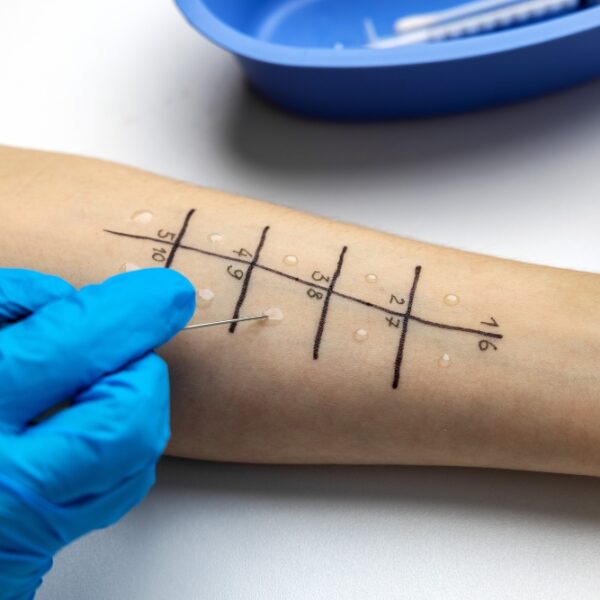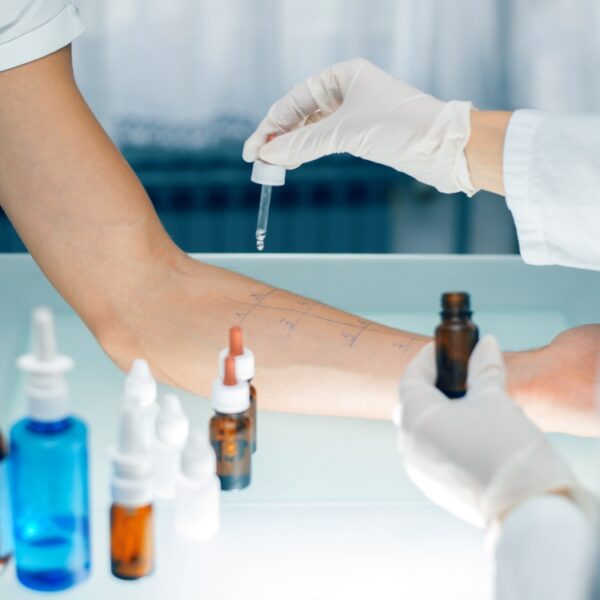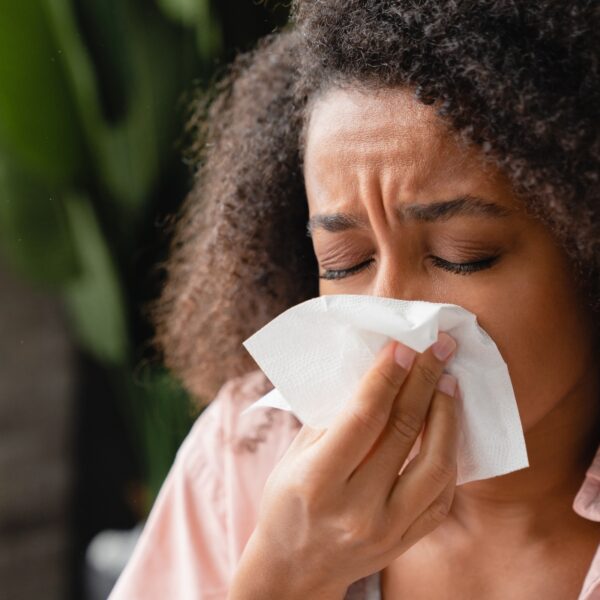Allergy Testing and Immunotherapy
Customized Allergy Testing and Treatment Plans
Allergies can be a frustrating and uncomfortable condition to live with. Relief is available through allergy testing and customized treatment plans if you struggle with persistent, nagging symptoms. Medical providers from Our Family Health will review and discuss your medical history, including your allergy symptoms to determine what type of allergy test is best to identify your allergens. Once your allergens are identified, our providers will create a comprehensive and personalized treatment plan which may include immunotherapy services.
Immunotherapy is a treatment that can provide lasting relief by desensitizing your immune system to the allergens. Allergy testing and immunotherapy are offered on- site at our medical center in Monroe.

Types of Allergy Testing Methods Explained
Both blood tests and skin scratch tests are used to identify allergens that trigger allergy symptoms. Blood tests work to measure the amount of antibodies your body produces in response to specific allergens. During a skin scratch test, a small amount of a specific allergen is applied to the skin, and the skin is then pricked to allow the allergen to enter the skin. If you are allergic to that allergen, you’ll develop a small bump or hive at the site of the skin prick. The medical providers at Our Family Health will help you determine which allergy test is right for you. Both are conducted at our Monroe office.
Benefits of allergy testing:
- Accurate identification of your specific allergens
- Quick and easy procedures
- Cost-effective approach to identifying your allergens
- Immediate results
- Safe and well-tolerated

When to Consider Allergy Testing
Many individuals learn to tolerate untreated allergy symptoms because they are unaware of the substantial improvement they can experience in their well-being with proper diagnosis and management. If you experience any of these symptoms on an ongoing basis, consider asking your medical provider if allergy testing would be beneficial for you:
- Itchy eyes, nose, and throat
- Nasal congestion or runny nose
- Watery eyes
- Hives, itchiness, or other skin conditions
- Restless poor sleep or snoring
- Ongoing joint pain unrelated to a pre-existing injury
- Consistent gastrointestinal distress
- Reoccurring headaches

Allergy Testing and Immunotherapy Frequently Asked Questions
Is there any special preparation before Allergy Testing?
Please refer to these instructions for medications to avoid and when they must be stopped prior to your allergy testing.
How long does testing take?
Skin scratch tests will take approximately 45 minutes. Blood tests will involve a blood draw and then typically 7-10 days to receive your results.
How much is a test?
Most allergy testing is covered by insurers. The specifics of each insurance plan will vary and you will need to confirm with your insurance provider. Visit our Insurance Information page to learn more about how to use your health insurance. Please call the medical center if you are uninsured and would like to learn more about our affordable pricing.
How do I get an allergy test?
The first step towards managing your allergy symptoms is to schedule an appointment with a medical provider. During this appointment, your provider will conduct a thorough examination and review your medical history to better understand your symptoms. Based on this assessment, they will recommend specific allergy tests that are appropriate for you. At Our Family Health, we offer a variety of allergy tests that can be performed on-site.
How are food allergies tested for?
Food allergy testing can be conducted using either skin scratch tests or blood work. Your medical provider will determine which approach is most suitable for you based on several factors, including the severity of your symptoms, medical history, and other relevant factors.
How do these tests work?
We conduct a skin test by applying a small amount of potential allergens to your skin, which helps us determine the specific allergens that trigger a reaction and confirms the presence of allergies. Blood tests measure the levels of antibodies that your immune system produces in response to a particular allergens.
What is immunotherapy for allergies?
Immunotherapy for allergies is a treatment that involves regular exposure to small doses of allergens to desensitize the immune system and reduce the severity of allergic reactions over time. The treatment is typically offered through injections, but there is also an option for sublingual drops.
Subscribe to Our Newsletter
Sign up to receive our latest news, events, and integrative help tips along with Dr. Plaster’s resource “Five Tips to Better Health."

Listen to Between Two White Coats
Learn about today’s most pertinent medical and wellness topics on our podcast.
Listen Now